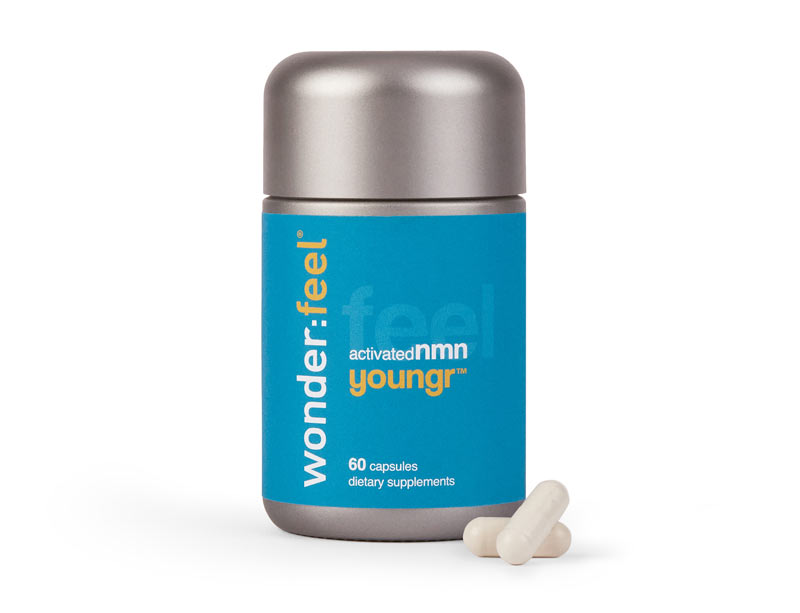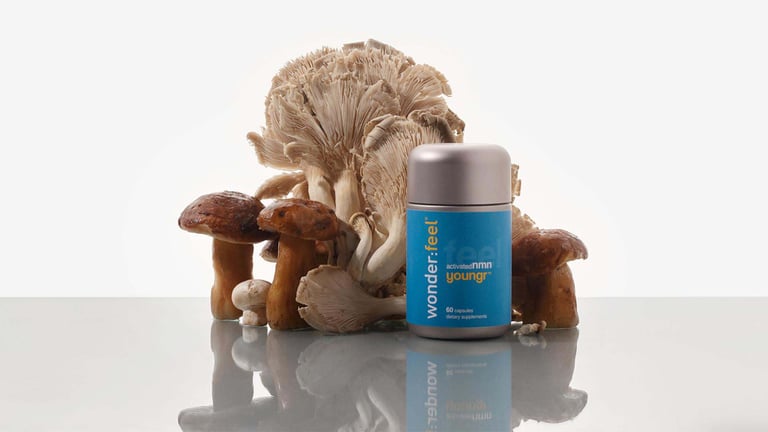Going grey is a hallmark of aging—and many of us go to extraordinary lengths to cover it up. Between regular salon visits and DIY kits to tackle greying brows, it’s clear that a lot of people aren’t ready to announce to the world that they’re racking up the decades (an honor, to be sure!). But dye jobs merely address a symptom, not the issue of greying hair itself. We’ve already reviewed how NMN, or nicotinamide mononucleotide, can actually help promote new hair growth. But what can NMN do for grey hair? Read on, and let’s find out!
What causes grey hair?
The expression “going grey” is actually misleading. The color of hair produced in a follicle is set—it doesn’t ever change its color, and that’s true regardless of your natural color. But over time, hair follicles produce less color because they lose melanin, which is created in special cells called melanocytes that can be found in individual hair follicles. This happens for two reasons. As we age, melanocyte function naturally declines, decreasing melanin production and making it more likely for hair to grow in grey. That typically begins after age 35, but genetics and ethnicity play a role here. Reason number two is oxidative stress, which truly wreaks havoc within hair follicles by damaging melanocytes. In time, the delicate balance between pro-oxidant and antioxidant activities falters, leading to the buildup of reactive oxygen species that trigger DNA damage, pushing cells into a state of senescence and eventually halting melanin production. That’s why reduced antioxidant defenses can fast track premature greying—and why targeted treatments are showing promise in repigmenting grey hair.

There can be other issues in play as well. Anyone familiar with President Barack Obama before and after his two terms may consider him a textbook example of stress-induced greying. And there is some evidence for the claim: A study with mice in 2020 found that stress can lead to greying fur, while a rather astonishing 2021 study not only linked psychological stress to greying hair in people, it also found that hair color can actually be restored once the source of stress is removed. As an aside, the study serves as yet another example that aging isn’t necessarily fixed and linear, but more malleable than we once suspected.
Now, beyond aging and stress, greying hair—especially when it’s premature—can be a red flag for illness, disorders, or nutrient deficiencies. Think thyroid issues and vitamin B, D and E deficiencies. Smoking is a big contributor to premature greying as well—yet another reason to kick the habit if you haven’t already. Hormonal changes, especially during menopause and andropause, can also affect hair pigmentation, as can environmental factors like over-bleaching or excessive exposure to UV rays. For most of us, however, going grey is largely genetic. So, what, if anything, can be done?
NMN and the aging process
NMN is a wondrous little molecule that supports an equally remarkable compound known as NAD, or nicotinamide adenine dinucleotide. We’ve covered NAD quite exhaustively around here, but suffice to say that it plays an absolutely essential role in all sorts of critical processes, from DNA repair to energy production to cognitive function. It’s also intrinsically tied to aging—the older we become, the less NAD we produce. In fact, by age 50, we have roughly half the NAD we enjoyed at 20. The decline is directly linked to all sorts of age-related diseases.
That’s where NMN comes in. As an NAD precursor, it helps elevate NAD levels in individual cells and body wide. And it’s so wonderfully effective that it’s medically considered an important player in longevity and overall well-being. The results are truly impressive—people taking NMN supplements report more energy, a clearer mind, greater skin elasticity, improved recovery times from exercise, hangovers and jet lag alike, and thicker, lusher hair. But what about its effect on grey hair?
Does NMN reverse or prevent grey hair?
Science is drawing definitive links between NMN supplementation for healthier hair growth, specifically relating to its ability to manage oxidative stress and regulate cell regeneration—both of which are beneficial when the issue is grey hair. While there isn’t as much research to reference regarding NMN and grey hair specifically, a handful of rodent studies have shown a reversal in age-related symptoms, and that includes both hair loss and greying.
Whether or not the same is true in humans is still to be determined—though anecdotal evidence abounds—but researchers have reason to be optimistic. NMN’s ability to boost NAD production can contribute to a deceleration in various signs of aging, hair health included, and the reports and scientific clues to date do suggest NMN supplementation may indeed slow down the greying process. While we wait for science to puzzle this out, you can enjoy the many proven benefits of NMN supplementation, which include a healthier scalp environment and rejuvenated hair follicles. That adds up to a lusher head of hair, whether it’s rocking that distinguished salt and pepper look or not.
As it happens, our Wonderfeel Younger™ formula is an excellent choice if hair health is your goal. It combines a clinically proven dose of NMN with potent antioxidants and sirtuin activators—ergothioneine, resveratrol, hydroxytyrosol, and vitamin D3—all of which work synergistically to defend against oxidative stress and inflammation. Not only does that make for greater efficiency, shielding the NMN during its delivery to the cell, it’s also an important consideration when the issue is greying hair! But don’t take our word for it. Here’s what fans and users of Wonderfeel Youngr™ have to say:
Six months of using Wonderfeel. My graying hair has returned to being its original brown, no gray visible.
Steady use of NMN over a few months does seem to have caused a modest but significant number of gray beard hairs to turn dark again, mostly the ones that have been gray for a shorter period of time.
I am actually seeing my hair color change from gray. I have been on it for one month only so I have a ways to go but very thankful for the product.
Encouraging, no?
The takeaway: NMN supplementation for greying hair
At this point, we can’t conclusively say that NMN prevents or reverses grey hair—the research just isn’t there yet. But what we can say is that NMN supplementation works wonders for slowing down visible signs of aging, and that includes thinning strands. Between the anecdotal evidence and the handful of mice studies to date, there is reason to believe NMN can slow or potentially reverse grey hair. The real test? Supplementing with NMN yourself to see what happens, and we invite you to get started right this way.













